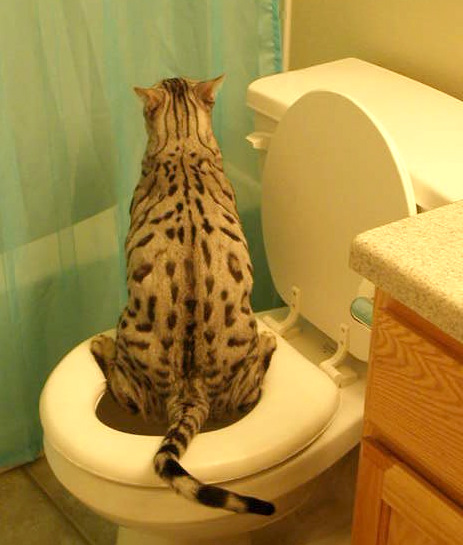Prevent Clogs and Damage: Never Flush Cat Poop Down Your Toilet - Professional Insights
Prevent Clogs and Damage: Never Flush Cat Poop Down Your Toilet - Professional Insights
Blog Article
They are making several good points relating to Don’t flush cat feces down the toilet as a whole in the content directly below.

Introduction
As cat proprietors, it's important to be mindful of just how we get rid of our feline buddies' waste. While it might appear practical to flush feline poop down the toilet, this technique can have damaging consequences for both the setting and human health and wellness.
Alternatives to Flushing
Fortunately, there are much safer and much more liable ways to deal with pet cat poop. Think about the adhering to options:
1. Scoop and Dispose in Trash
One of the most typical approach of getting rid of cat poop is to scoop it right into a biodegradable bag and throw it in the garbage. Make sure to make use of a devoted clutter scoop and take care of the waste quickly.
2. Usage Biodegradable Litter
Opt for naturally degradable pet cat litter made from products such as corn or wheat. These litters are eco-friendly and can be securely gotten rid of in the garbage.
3. Bury in the Yard
If you have a lawn, take into consideration burying feline waste in a marked location away from vegetable yards and water sources. Make sure to dig deep adequate to prevent contamination of groundwater.
4. Set Up a Pet Waste Disposal System
Buy a pet waste disposal system particularly made for cat waste. These systems use enzymes to break down the waste, minimizing smell and environmental effect.
Wellness Risks
Along with ecological concerns, flushing feline waste can likewise posture health risks to people. Feline feces may include Toxoplasma gondii, a parasite that can trigger toxoplasmosis-- a possibly extreme ailment, specifically for pregnant women and individuals with weakened immune systems.
Environmental Impact
Purging feline poop presents unsafe virus and bloodsuckers right into the water supply, posing a significant risk to aquatic communities. These pollutants can negatively affect marine life and concession water quality.
Final thought
Accountable pet dog possession expands past giving food and sanctuary-- it likewise includes proper waste management. By avoiding flushing pet cat poop down the commode and going with different disposal techniques, we can lessen our environmental footprint and protect human wellness.
Why Can’t I Flush Cat Poop?
It Spreads a Parasite
Cats are frequently infected with a parasite called toxoplasma gondii. The parasite causes an infection called toxoplasmosis. It is usually harmless to cats. The parasite only uses cat poop as a host for its eggs. Otherwise, the cat’s immune system usually keeps the infection at low enough levels to maintain its own health. But it does not stop the develop of eggs. These eggs are tiny and surprisingly tough. They may survive for a year before they begin to grow. But that’s the problem.
Our wastewater system is not designed to deal with toxoplasmosis eggs. Instead, most eggs will flush from your toilet into sewers and wastewater management plants. After the sewage is treated for many other harmful things in it, it is typically released into local rivers, lakes, or oceans. Here, the toxoplasmosis eggs can find new hosts, including starfish, crabs, otters, and many other wildlife. For many, this is a significant risk to their health. Toxoplasmosis can also end up infecting water sources that are important for agriculture, which means our deer, pigs, and sheep can get infected too.
Is There Risk to Humans?
There can be a risk to human life from flushing cat poop down the toilet. If you do so, the parasites from your cat’s poop can end up in shellfish, game animals, or livestock. If this meat is then served raw or undercooked, the people who eat it can get sick.
In fact, according to the CDC, 40 million people in the United States are infected with toxoplasma gondii. They get it from exposure to infected seafood, or from some kind of cat poop contamination, like drinking from a stream that is contaminated or touching anything that has come into contact with cat poop. That includes just cleaning a cat litter box.
Most people who get infected with these parasites will not develop any symptoms. However, for pregnant women or for those with compromised immune systems, the parasite can cause severe health problems.
How to Handle Cat Poop
The best way to handle cat poop is actually to clean the box more often. The eggs that the parasite sheds will not become active until one to five days after the cat poops. That means that if you clean daily, you’re much less likely to come into direct contact with infectious eggs.
That said, always dispose of cat poop in the garbage and not down the toilet. Wash your hands before and after you clean the litter box, and bring the bag of poop right outside to your garbage bins.
https://trenchlesssolutionsusa.com/why-cant-i-flush-cat-poop/

As a fervent person who reads on Can You Flush Cat Poop Down The Toilet?, I think sharing that piece of content was valuable. Do you know another individual who is excited about the subject? Be sure promote it. I am grateful for your time. Come back soon.
Schedule A Service Report this page